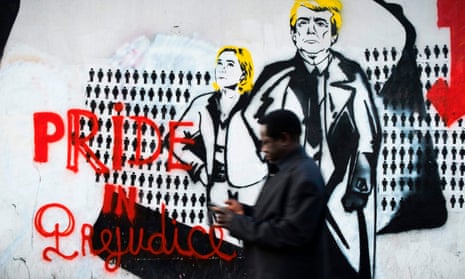Donald Trump has offered a tacit endorsement of Marine Le Pen in the French presidential election, describing the far-right leader as the “strongest” candidate in the first-round vote this Sunday.
The US president told the Associated Press that although he was not “explicitly endorsing” the leader of the Front National, she was the “strongest on borders, and she’s the strongest on what’s been going on in France.”
“Whoever is the toughest on radical Islamic terrorism, and whoever is the toughest at the borders, will do well in the election,” he said.
Typically, US presidents avoid speculation on overseas elections. But Trump suggested his opinion was no different from any other: “Everybody is making predictions on who is going to win. I’m no different than you.”
The president also said that Le Pen’s candidacy would be boosted after the fatal shooting of police officer in central Paris, which was claimed by Islamic State less than 72 hours ahead of the polls.
Earlier on Friday, Trump had tweeted about the attack’s potential impact on the vote, writing: “Another terrorist attack in Paris. The people of France will not take much more of this. Will have a big effect on presidential election!”
Le Pen is one of eleven candidates in a tight race. The top two candidates will advance to a runoff on 7 May.
She is currently neck-and-neck in polling for the first-round vote with the outsider centrist candidate Emmanuel Macron, closely followed by the rightwing François Fillon.
Le Pen has long praised Trump and told CNN in a November interview that his election was an inspiration to her political efforts in France. “Donald Trump has made possible what was presented as completely impossible,” said the French politician. “So it’s a sign of hope for those who cannot bear wild globalization. They cannot bear the political life led by the elites.”
Le Pen visited Trump Tower in January although she did not meet with the then-president-elect.
However, two strongly pro-Trump Republican members of Congress – Steve King of Iowa and Dana Rohrabacher of California – met with Le Pen in France in February. She had also previously met with King in October 2016 .
Her party, the National Front, has long been of the leading far-right political organizations in Europe and stridently anti-Muslim and xenophobic. However, under Le Pen’s leadership, the party has tried to make itself slightly more palatable to voters. In 2015, it expelled Jean-Marie Le Pen, the party’s leader for three decades and father of Marine Le Pen for Holocaust denial.
Le Pen also has close ties to Russia. The National Front financed itself with a loan from a Russian bank and Le Pen has praised Vladimir Putin and has falsely claimed that Russia did not invade Crimea, the Ukrainian peninsula it has occupied since 2014.
Trump is not the only American politician to weigh in on the presidential election. On Thursday, Macron spoke to former president Barack Obama in a phone call which his campaign publicized.
Let’s keep defending our progressive values. Thank you for this discussion @BarackObama. pic.twitter.com/8rhNdHkLo8
— Emmanuel Macron (@EmmanuelMacron) April 20, 2017
An Obama spokesman later said that the call was not intended as an explicit endorsement of Macron.
